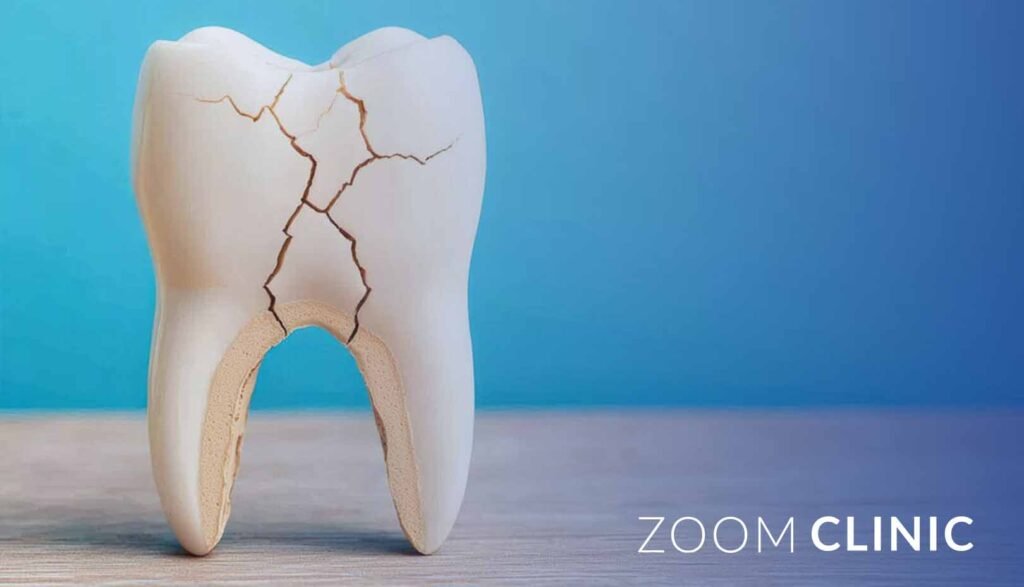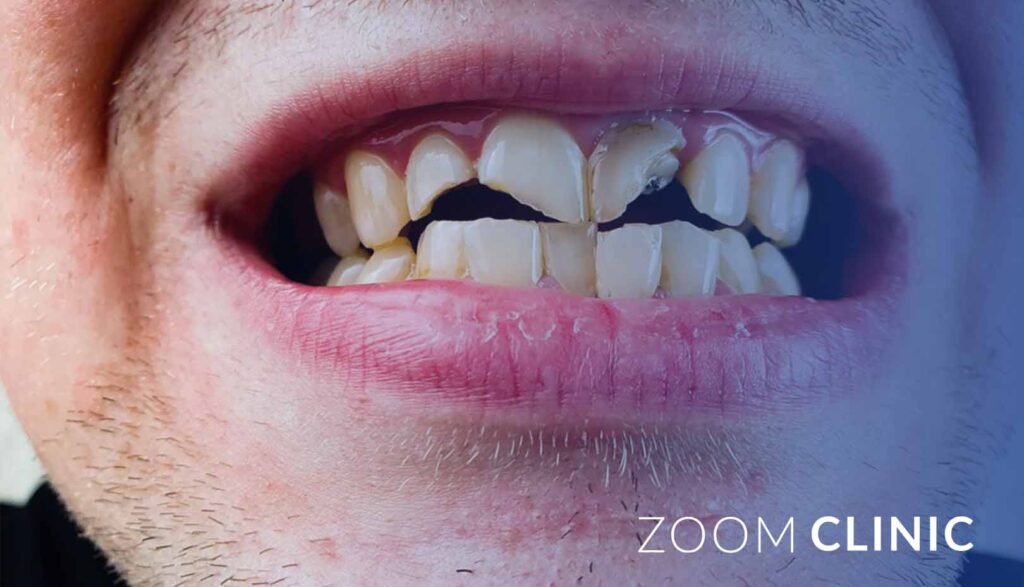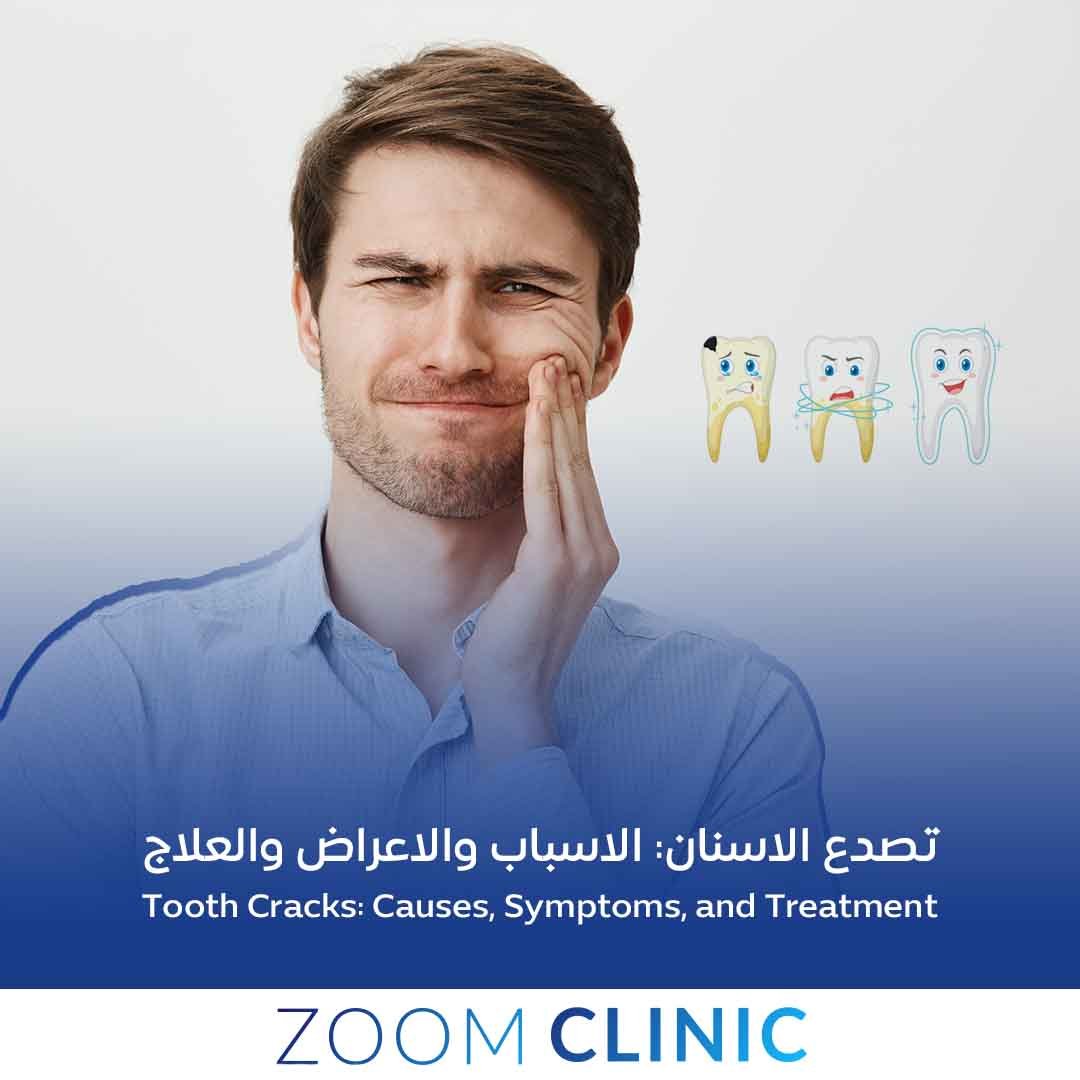An Informative Guide by Zoom Clinic, the Best Dental Clinic in Istanbul, Turkey
Dental health is an integral part of overall well-being, and issues such as cracked teeth can disrupt both your smile and quality of life. At Zoom Clinic, Istanbul’s premier dental clinic, we specialize in providing effective treatments tailored to each patient’s unique needs. In this blog, we delve into everything you need to know about cracking teeth—its causes, symptoms, and the advanced treatments we offer to restore your dental health.
Table of content
Understanding Cracked Teeth
A cracked tooth refers to a break or split in the tooth’s enamel or structure. Unlike other dental issues, cracks may not always be visible, making it crucial to identify symptoms and address the problem promptly.
Cracked teeth can range from minor surface cracks to deep splits extending into the root. The severity of the crack often determines the treatment needed.
Common Causes of Cracking Teeth

1. Biting Hard Objects
Chewing on hard substances like ice, nuts, or candies can exert undue pressure on teeth, leading to cracks over time.
2. Bruxism (Teeth Grinding)
Habitual grinding or clenching of teeth, often during sleep, creates excessive pressure that weakens tooth enamel, making it prone to cracks.
3. Injuries and Trauma
Accidental falls, sports injuries, or impacts to the mouth can cause immediate cracking or chipping of teeth.
4. Weak Tooth Structure
Teeth with large fillings, especially those weakened by decay, are more susceptible to cracks.
5. Sudden Temperature Changes
Consuming very hot and cold foods or beverages in quick succession can cause the enamel to expand and contract, resulting in cracks.
6. Age-Related Wear
Teeth naturally weaken with age, making individuals over 50 more prone to cracks.
Symptoms of Cracked Teeth
Cracked teeth often exhibit subtle signs that can easily be mistaken for other dental problems. Look out for the following symptoms:
- Pain While Chewing
Discomfort or sharp pain when biting down can indicate a crack, especially if the pain comes and goes. - Sensitivity to Temperature
A cracked tooth may cause heightened sensitivity to hot or cold foods and drinks. - Swollen Gums
Swelling near a cracked tooth could signify an underlying issue, such as an infection or inflammation. - Intermittent Pain
Unlike cavities, cracks often lead to sporadic pain rather than continuous discomfort. - Visible Lines or Fractures
In some cases, you may notice fine lines or cracks on the surface of the tooth. - Feeling Unevenness
The tongue may detect uneven edges or roughness along the tooth surface.
Types of Cracks in Teeth

Cracked teeth can be categorized based on their severity and location. Understanding the type of crack helps determine the most appropriate treatment.
1. Craze Lines
These are superficial cracks in the enamel and typically do not require treatment. They are common and usually painless.
2. Fractured Cusp
This occurs when a piece of the tooth’s chewing surface breaks off, often around a filling. It may require restorative treatment.
3. Cracked Tooth
A crack extending vertically from the chewing surface toward the root can cause pain and damage. Early intervention is essential.
4. Split Tooth
A severe crack that splits the tooth into two segments. This often requires extraction or advanced restorative procedures.
5. Vertical Root Fracture
These cracks start from the root and move upward. They are less visible but can cause significant pain and swelling.
Diagnosis of Cracked Teeth at Zoom Clinic
Identifying a cracked tooth can be challenging without professional assistance. At Zoom Clinic, our experienced dentists utilize state-of-the-art technology for accurate diagnosis.
Diagnostic Techniques:
- Visual Examination
A thorough inspection of the teeth under specialized lighting to identify cracks. - Probing with Instruments
Gently probing the tooth surface to locate cracks or rough areas. - Bite Tests
Asking patients to bite on a dental instrument to pinpoint pain caused by cracks. - X-Rays
While cracks may not always appear on X-rays, they help detect underlying issues like infections or decay. - Dye Application
Using a dye to highlight cracks not visible to the naked eye.
Treatment Options for Cracked Teeth

At Zoom Clinic, we provide a range of advanced treatments to address cracked teeth effectively. The choice of treatment depends on the severity and location of the crack.
1. Bonding
For minor cracks, composite resin can be applied to fill the crack, restoring the tooth’s appearance and functionality.
- Procedure:
- Cleaning the tooth.
- Applying composite resin.
- Curing the material with a special light.
- Benefits:
- Quick and cost-effective.
- Suitable for minor cracks.
2. Dental Crowns
A crown covers the damaged tooth, providing protection and restoring strength.
- Procedure:
- Removing damaged tooth material.
- Taking impressions for a custom crown.
- Placing the crown on the prepared tooth.
- Benefits:
- Long-lasting solution.
- Ideal for larger cracks.
3. Root Canal Treatment
If the crack extends to the pulp, a root canal may be necessary to remove the infected tissue and save the tooth.
- Procedure:
- Cleaning out the pulp.
- Sealing the tooth with gutta-percha.
- Placing a crown for protection.
- Benefits:
- Preserves the natural tooth.
- Prevents infection.
4. Extraction
In cases of severe damage, where the tooth cannot be saved, extraction may be the only option.
- Procedure:
- Removing the cracked tooth.
- Replacing it with a dental implant or bridge.
- Benefits:
- Prevents complications.Allows replacement with a durable solution.
5. Preventive Measures Post-Treatment
To maintain the health of treated teeth, our dentists at Zoom Clinic recommend the following:
- Avoid chewing hard foods.
- Use a night guard if you grind your teeth.
- Maintain good oral hygiene.
- Visit the dentist regularly for check-ups.
Preventing Cracked Teeth
Prevention is better than cure. Follow these tips to protect your teeth from cracking:
- Wear a Mouthguard: Use a protective guard during sports or if you grind your teeth at night.
- Avoid Hard Foods: Refrain from chewing on ice, hard candy, or similar items.
- Practice Good Oral Hygiene: Brush and floss regularly to keep teeth strong.
- Use Fluoride Treatments: Strengthen enamel with fluoride toothpaste or treatments.
- Address Dental Issues Promptly: Treat cavities or damaged teeth early to prevent cracks.
Why Choose Zoom Clinic for Your Dental Needs?
Located in the heart of Istanbul, Zoom Clinic stands as the leading dental care provider in Turkey. Here’s why patients from around the world trust us:
- Expertise and Experience: Over a decade of excellence in dental care.
- Advanced Technology: Cutting-edge equipment for precise diagnosis and treatment.
- Personalized Care: Customized treatment plans to meet individual needs.
- Affordable Prices: High-quality care at competitive rates.
- Multilingual Staff: We cater to international patients with ease.
Conclusion
Cracked teeth are a common yet often overlooked dental issue that can escalate if not treated in time. By understanding the causes, recognizing the symptoms, and seeking timely treatment, you can safeguard your dental health. At Zoom Clinic, our team of experts is dedicated to providing world-class care to restore your smile and confidence.
Book your consultation today and experience why we’re Istanbul’s top choice for dental excellence!
Get the special offer today from Zoom Clinic
Related Articles:
Hollywood Smile Installation Without Shaving or Filing


